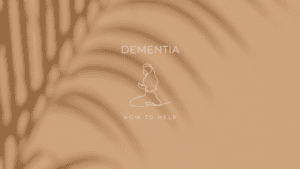Hearing that your loved one is diagnosed with any type of disease is absolutely heartbreaking. Diseases such as Alzheimer’s and different forms of dementia can take away your loved one’s ability to remain 100% independent. Although it can be very hard on your loved one and the family, it is now your duty to help them protect their dignity and pride.
Be patient with them. Don’t try to correct them. Let them live in whatever moment they are in… and join them there” – Martha B.
Symptoms of dementia can come and go depending on the day, but overall there is no cure. If your loved ones dementia isn’t severe, they will be fully aware of what is going on. That can be a very frightening thought for your loved one to try to comprehend. Hearing that they have been diagnosed with dementia and are fully aware of what is going on, can make them question themselves. Although this is not an easy stage in life, there are many things that you can do to help you and your loved one through this process. Here are some steps to take after your loved one has been diagnosed.
Get prepared
To best prepare, do research on how you can best support your loved one. Instead of jumping into a serious conversation, listen to your loved ones thoughts and feelings. This can be a very overwhelming time for your loved one so allowing them to process what they’re thinking is very important. In addition to choosing the right time and place to have a serious conversation, ensure that you’re in a calm atmosphere with no distractions. This is a very personal conversation that should be kept confidential.
Plan
Create an action plan for every possible outcome. Showing your loved one that you’re by their side throughout this whole process is very reassuring and also provides them with a sense of comfort. Creating a safe environment for your loved one is important so that they never feel alone. When figuring out a plan, be sure to never push them in certain directions. Allow them to process and guide the conversation where they want it to go.
Meaning
Be aware of how you are portraying your thoughts and feelings towards your loved one. Keep your conversations neutral rather than lecturing them. Slow down and be sure to leave pauses in between each sentence. This allows your loved one to process and understand everything that is going on. Always include your loved one conversations that you’re having that involves them. Many times, people with dementia can feel isolated so ensuring that you communicate through them shows how much you value them and their opinions.
What NOT to do
- Don’t present multiple ideas to them at once
- Don’t treat them like a child
- Don’t take away all of their independence
- Don’t ask how their day was…instead stick to the present
- Don’t try to quiz your loved one to see what they can remember
- Don’t say, “remember me?”
The discussion you have with your loved one after receiving their diagnosis is crucial. Although these can be very difficult conversations to have, allowing your loved one to process is the most important part. Allow your loved one to feel comfortable having an open conversation about their thoughts and feelings without projecting yours onto them. By preparing for this conversation, it can help you and your loved ones grow a stronger relationship. At Woodstone Senior Living, we are dedicated to treating our residents as the unique individual that they are. We implement daily activities that create a sense of purpose for each of our residents. Learn more about the services we offer at Woodstone Senior Living.
Best,
Danielle Morrow
Marketing Specialist


